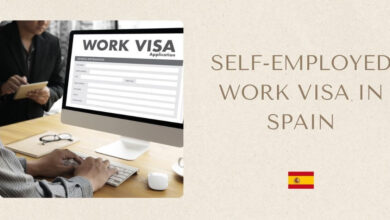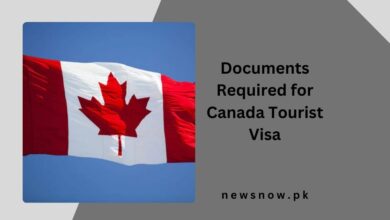Workers & Students Canada Visa Updates 2025: For Foreigners
The immigration laws of Canada will undergo substantial modifications. British Columbia is in the process of implementing a more efficient credential recognition system for foreign professionals, and the Closed Work Permit program is being phased out. These revisions will have a substantial effect on international laborers and students who are seeking employment opportunities in Canada.
Canada has revised its protocols for recognizing credentials and work permits for 2025, a change that will impact foreign students and professionals. As the nation endeavors to enhance its immigration laws and address labor shortages, these modifications are being implemented.
1. Closure of the Closed Work Permit:
The Closed Work Permit, which has been a critical element of Canada’s work visa program for many years, is on the brink of being eliminated.
Knowing the Closed Work Permits Program:
Foreign professionals were permitted to work in Canada as long as they obtained an authorized Labour Market Impact Assessment (LMIA) and had a legitimate employment offer when the Closed Work Permit was initially implemented in 1973. This initiative was established to aid Canadian firms in the recruitment of exceptional individuals from outside the country when local workers were unavailable.
Problems with the Closed Work Permit:
- Foreign laborers may be exploited and have limited career mobility because they are only permitted to work for one employer while holding this permit.
- Employer Restrictions: Businesses have encountered challenges in relocating their personnel between locations due to the restrictive framework of this permit.
- The Canadian labor market has been impacted by the fact that some companies have been able to avoid employing local laborers, which has raised concerns about the potential impact on domestic employment.
What Comes Next for the Closed Work Permit?
The Canadian Senate proposed the incremental abolition of the Closed Work Permit over the course of the subsequent three years. In order to continue working in Canada, foreign laborers must investigate alternative visa options, as the government is required to respond to this recommendation within 150 days.
2. British Columbia Simplifies the Process for Experts:
To facilitate the integration of foreign experts into the local workforce, British Columbia has implemented a new, more efficient, and streamlined approach to recognizing international credentials. This is a component of the province’s strategy to resolve the increasing demand for skilled labor in several critical sectors.
A Novel Era in Credential Acknowledgment:
The objective of the new system is to expedite the integration of foreign professionals into British Columbia’s employment by simplifying the verification procedure for foreign degrees and work experience.
Check Also: Canada Visitor & Tourist Visa Updates
Benefits of Workers & Students Canada Visa:
- Prospects for Employment: The employment market in Canada is robust, with a high demand for skilled workers in a variety of sectors, such as healthcare, technology, engineering, and trades.
- Route to Permanent Residence: Numerous work visas offer a route to permanent residency, enabling foreign laborers to establish permanent residence in Canada. Skilled laborers are prioritized in immigration programs such as the Express Entry system.
- Competitive salaries: In Canada, employees frequently have the opportunity to advance their careers and earn competitive salaries and benefits.
- Enforced Labor Rights: Canada’s labor laws are robust and safeguard the rights of workers, including the provision of safe working conditions, equitable wages, and against discrimination.
- Multicultural Setting: Canada is renowned for its diversity, which fosters an inclusive work environment that enables individuals from a variety of origins to flourish and collaborate.
- Professional Development: Numerous employers provide employees with opportunities for skill development, continuing education, and training, which facilitates their professional development.
- Family Advantages: Spouses and dependent children may be permitted to accompany work visa holders to Canada during their stay.
- Access to Health Care: Depending on the province and the duration of their stay, individuals may be eligible for provincial health care coverage while on a work visa.
- Opportunities for Networking: Individuals can establish professional networks, engage in community events and organizations, and establish connections with industry executives by working in Canada.
- Advantages of a Student Visa High-Quality Education: Canada’s education system is internationally recognized, with a plethora of institutions that provide high-quality programs and degrees.
- Work Permit for Post-Graduation: Upon completion of their studies, international students are eligible to apply for a Post-Graduation Work Permit (PGWP), which enables them to acquire work experience in Canada.
- Route to Permanent Residence: Many immigration programs prioritize individuals with Canadian educational credentials and work experience, which can serve as a pathway to permanent residency.
- Cultural Influence: International students have the chance to immerse themselves in Canadian culture and traditions, which fosters personal development and global awareness.
- While studying, one may engage in employment: While pursuing their education, student visa holders are permitted to work part-time, which provides them with valuable work experience and financial support.
Important Changes in the New Framework:
- Experience Requirements Reduced: Foreign professionals will encounter fewer difficulties in qualifying for positions than they did in their previous work experience.
- Language Proficiency Standards Relaxation: In order to facilitate the entry of individuals with recognized abilities into the workforce more rapidly, the province is also considering reducing the language proficiency standards for a number of occupations.
Occupational Targets in British Columbia:
This new method applies to 29 occupations, where there is a significant demand for competent individuals. The following are among the significant occupations:
- Early Childhood Educator
- Lawyer
- Social Worker
- Land Surveyor
- Chartered Accountant
- Biology Technologist
This expedited procedure will reduce the time it takes for foreign professionals to commence their professional careers, thereby addressing acute shortages in the legal system, education, and social services, among other sectors.
The Implications for Canada’s Workforce of These Changes:
Changes to Canada’s visa requirements for 2025 indicate a significant transformation in the country’s immigration and employment laws. The phase-out of the Closed Work Permit is a component of a broader initiative to prioritize Canadians in the employment market, despite the potential challenges faced by certain foreign workers.
Nevertheless, the new credential recognition scheme in British Columbia serves as a testament to Canada’s dedication to the recruitment of qualified foreign workers and the covering of labor gaps in critical sectors.
Getting Ready for the Shift:
The government promotes the exploration of alternative immigration pathways, such as open work permits, by foreign professionals who are currently holding or applying for a Closed Work Permit in order to pursue their professions in Canada. In the interim, candidates who are interested in British Columbia may find that the new credential recognition system provides speedier employment opportunities in the province’s thriving industries.
This policy change indicates a new direction for professionals and students who aspire to immigrate to Canada in 2025 and beyond, as it is indicative of Canada’s commitment to achieving a harmonious equilibrium between its immigration laws and the requirements of local workers.
Frequently Asked Questions:
Can you have both study and work permit in Canada?
Indeed. Under International Experience Canada (IEC), it is permissible to possess two valid permits concurrently. Even if you possess a valid study permit, you are eligible to file for an IEC Work Permit, if you receive an invitation to do so. If you possess a legitimate work permit through IEC, you may also apply for a study permit.
Does a Canada student Visa come with a Work Permit?
You must apply and be approved for a study permit before you arrive in Canada. Review the list of documents you need, to apply for a study permit, and discover how the application process works. If you want to work during your studies, you will need to apply for a work permit.
What if I work more than 20 hours in Canada on a study permit?
You can work up to 20 hours per week. Working more than 20 hours per week is a violation of your study permit conditions. You lose your student status for doing this, and may not be approved for a study or work permit in the future. You may also have to leave the country.




